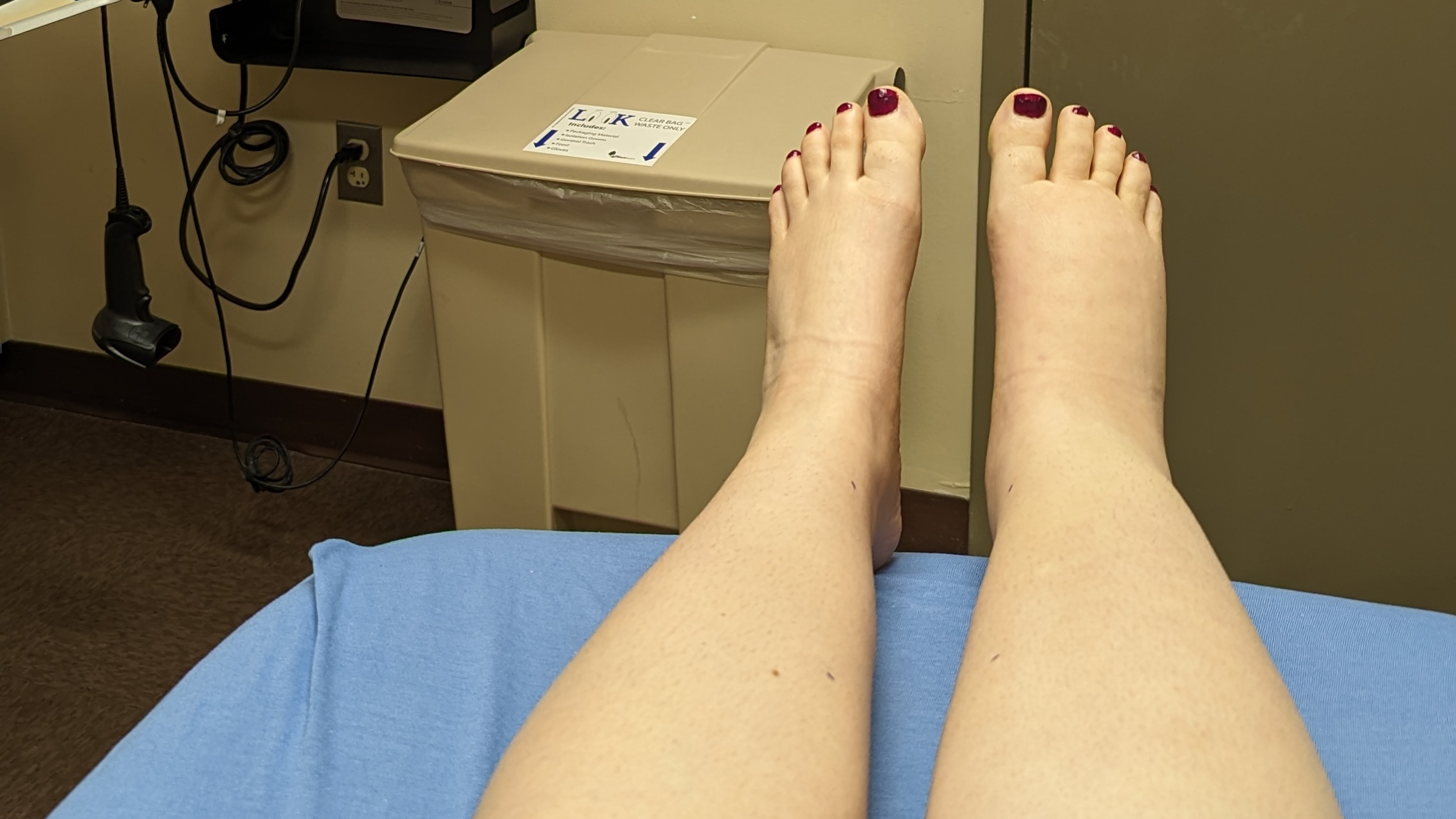Last year, 21-year-old Matheus from Brazil developed lymphedema in his left leg after an accident.
“Everything is very new for me,” he said. “I’m still trying to adapt myself into this psychological-physical reality.”
Matheus described the lymphedema experience perfectly: receiving the diagnosis can create a massive shift in the way you see yourself and how you engage with the world around you, for better or worse. It takes time to adjust.
In the final installment of this week-long series focusing on men with lymphedema, we’ll hear from four more men on how they’ve adapted to their own lymphedema reality.
Finding confidence
“At thirteen years old a simple sprained ankle caused swelling in my right leg,” Andy from England began.
The swelling didn’t go down, though, and after months of research by Andy’s dad, they found a doctor – and a diagnosis of primary lymphedema.
As a sports-mad thirteen year old with dreams of becoming an athlete, Andy was absolutely shattered. But he pushed through and adapted to his new reality, wearing his compression bandages and coping with the daily stresses of life with lymphedema.
Andy has faced a slew of health challenges since his diagnosis nearly twenty years ago: “I’m prone to infection. A little knock, cut, or stubbed toe leads to cellulitis,” he explained. “I am fine one minute but then a burning pain comes in my leg.”
“On one occasion I ended up on intensive care with pneumonia after being admitted with cellulitis,” he continued. “Months spent in hospital and many tests – we are still unsure why I’m hit as hard as I am. This is terrifying not just for me, but for my young family.”
“I’m a strong lad and have a great family and friends who support me, so I will keep coming back stronger.”
Still, self-confidence is a struggle for Andy. For all his attitude on the sports field or in a bar, Andy is uncomfortable when it comes to people seeing his legs. He wears trousers in the summer just to hide his compression stockings and avoid people’s judgmental stares.
“People know I have lymphedema, but very rarely do I let people see my legs,” he said. “I hate the idea that people stare at me.”
However, he’s come a long way in turning his experience with lymphedema into a positive one.
“I have had the honor of attending several events and speaking to parents and young sufferers of this horrible condition,” he said. “If I can inspire just one person, then it’s worth the hassle.”
“I played football to a very high standard, I traveled the world playing cricket whilst fighting this condition. I will keep doing what I do and pushing myself to the limit.”
Andy takes strength from his family and friends, who have been a massive support to him through it all.
“You have to live your life and make the most of it because you never know when it will be taken away,” Andy said. “I’m proud of me, I’m proud of what I have done, and most of all I’m proud of being a lymphedema ninja!”
Living in the now
“My problems began as a sophomore in high school,” shared the now 34-year-old Nick. “At the time, we just thought it was lymphedema.”
For years Nick saw physicians and underwent surgical procedures all over the country, from the Mayo Clinic in Minnesota to Boston Children’s Hospital. But it wasn’t until he visited the Vascular Malformation Center in Denver, Colorado, that he finally received an official diagnosis: a venolymphatic malformation in his left thigh.
“It acts very similarly to lymphedema,” explained Nick. “It’s a collection of malformed venous and lymphatic channels, so I’ve got the best – or worst – of both worlds.”
Because he has been wearing compression stockings since he was fifteen, Nick is fortunate in that his disorder is less serious than it could have been. However, living with the disorder and wearing compression stockings have taken a toll on his self-esteem and his relationships.
“It’s not easy not knowing anyone else who is my age and my own gender who has the same issues,” Nick said. “I do know one female in another town who has lipedema, but it’s a little bit different.”
“I think we’ve all dealt with bouts of depression and feeling insecure, but I think one positive thing that I can attest to my experience is it has definitely made me a stronger person. A better person,” Nick continued. “And although I haven’t publicly ‘come out’ as having a lymphatic disorder [like on social media], I never try to make it an excuse as to not do something and experience life the way we were meant to.”
A big challenge for Nick is how his disorder affects his appearance, especially as a member of the gay community where “appearance is everything.” He’s so self-conscious about his compression that he won’t wear shorts during the summertime, no matter how unbearable the heat may be.
“I’ve still not gotten over the ‘appearance’ factor,” Nick said. “I am so worried about people staring at my compression stocking or asking questions that I’d almost just rather wear jeans or lighter-style pants.”
He’s working on it, though: “As I get older, I realize how stupid my insecurities are and to just not ‘give a damn’ about what other people think.”
Most of Nick’s friends and family know about his venolymphatic malformation and are familiar with his stockings, and he pulls strength from their support and encouragement.
“Without my family, I don’t think I’d be the person I am today,” Nick reflected. “My parents were with me through every single doctor visit, in multiple cities across the country, and it makes me want to cry the amount of support I’ve received through them.”
In February of 2016, Nick came down with an infection of an unknown cause in his thigh; the thought of something like that coming back has worried him ever since. He doesn’t know if his condition will worsen as he ages, but he tries not to let his fears and insecurities hinder him.
“I’ve been learning to live in ‘the now’ and just go day-by-day,” Nick said. “Count my blessings and live my life as freely as possible.”
Speaking out
27-year-old Ashley has had lymphedema for his entire life, but it’s only been within the last few years that he’s learned to accept his lymphedema and not hate it.
“I think for me the hardest part of living with lymphedema is the psychological battle I’d go through on a daily basis. It used to get me so depressed knowing that I’d have this condition for the rest of my life,” he said. “Feeling so self-conscious and thinking I’d be alone forever – I’d have been happy if someone would have just cut my arm off.”
“Usually whenever I’m asked what is wrong with my arm and hand and explain that it’s lymphedema, most people always assume that only women suffer with the condition and are quite confused when I tell them I was just born this way.”
Living in the UK, Ashley is lucky to have decent access to compression garments and lymphedema support. He also says that it’s fortunate that women with lymphedema speak up about the condition, because without them the lymphedema community wouldn’t have a voice: “They give people confidence to live with their condition instead of against it.”
“Growing up with lymphedema was quite difficult, especially having it in my arm and hand so everyone could see, and everyone could stare,” said Ashley. “I felt so different because there was nobody I could relate to.”
Ashley says the only people he’s met in person with lymphedema are older women, and although he appreciates their experiences and support, he’d like to connect with other male patients, too.
“What is frustrating is that there isn’t a lot of men that speak out about lymphedema,” Ashley said. “There is quite a large Instagram community but it’s very rare that I see a man post about lymphedema.”
“I can imagine most of the men feel alone in the world of lymphedema [because it is] mostly populated by women. I know I do.”
A conversation with Charlie
My Facebook pinged with a new message: it was my friend, Charlie.
“Hi again. I saw your post about men with lymphedema.”
I was hoping to hear from him. Charlie has lymphedema in both legs and has struggled in the past with accepting the life sentence that is a chronic condition.
“I haven’t noticed anything different about being a man with lymphedema,” said Charlie. “But I haven’t really talked to anyone about it other than you.”
Charlie is pretty private about his lymphedema, and most people don’t notice it because he keeps his swelling well-maintained through compression stockings and treatment.
“My legs are skinny so they look like normal legs,” Charlie explained. “People just think I’m wearing high socks for some reason.”
Be that as it may, Charlie still doesn’t wear shorts – even in the summer – because he doesn’t want people to see his compression stockings.
“I wish I felt better about people seeing me in the socks,” he said. “I’m not really open about it. Most people in my life have no idea I have lymphedema.”
He only talks about his lymphedema if he has to, like after his former roommates saw him in a pair of shorts, or when he starts dating someone new. If another male lymphedema patient wanted to chat, though, he said he’d be open to it and would “love to talk to anyone that wanted to talk about it.”
For Charlie, though, being a male lymphedema patient in a female-dominated community has never impeded him in seeking treatment.
“I don’t look at gender that way,” Charlie said. “I never thought it was a ‘woman’s disease,’ and if it was, who cares?”
Charlie feels hopeful about the research currently being done on lymphedema, especially its relation to inflammation. He’s been trying to maintain an anti-inflammatory diet along with his regular lymphedema treatment routine, and he thinks it’s been helping.
“I have been incredibly fortunate so far – don’t want to jinx it by saying that,” Charlie said. “I saw my therapist for the first time in a long time and my measurements were down everywhere by 5-7%.”
That’s not the only good news: Charlie graduated law school in May and just got an offer to be an attorney at a law firm.
“I wish I had known when I was diagnosed that life can go on and one can still pursue their dreams,” Charlie said. “I barely made it through the beginning part – got close to suicide multiple times. Glad I’m still here.”
“I’m glad you’re still here, too,” I said. “I get what you mean about wishing you had known all that in the beginning, but it’s sort of more significant that you didn’t, because look what you’ve done in spite of it all. You not only pushed through – you’ve succeeded, and you proved your own self wrong!”
I asked Charlie if he had a crystal ball that told him it’d all work out, would he have still fought as hard as he did, or would he have gotten complacent because he already knew the ending?
“I probably would have gotten complacent, you’re right,” Charlie replied. “I am very fortunate about the measurements. I can live a ‘normal’ life and no one knows I have lymphedema unless I tell them.”




Leave a Reply to taoharpsCancel reply